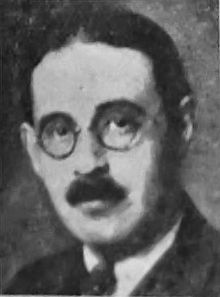
Back هارولد لاسكي Arabic هارولد لاسكى ARZ Harold Laski Azerbaijani هارولد لسکی AZB হ্যারল্ড লাস্কি Bengali/Bangla Harold Laski Czech Harold Laski Welsh Harold Laski German Harold Laski Spanish Harold Laski Basque
Harold Laski | |
|---|---|
 Laski in 1936 | |
| Born | Harold Joseph Laski 30 June 1893 Manchester, England |
| Died | 24 March 1950 (aged 56) London, England |
| Political party | Labour |
| Spouse |
Frida Kerry (m. 1911) |
| Academic background | |
| Alma mater | University College London New College, Oxford |
| Influences | |
| Academic work | |
| Discipline | |
| Sub-discipline | |
| School or tradition | Marxism |
| Institutions | London School of Economics |
| Doctoral students | |
| Notable students | |
| Notable works | A Grammar of Politics (1925) |
| Influenced | |
Harold Joseph Laski (30 June 1893 – 24 March 1950) was an English political theorist and economist. He was active in politics and served as the chairman of the British Labour Party from 1945 to 1946 and was a professor at the London School of Economics from 1926 to 1950. He first promoted pluralism by emphasising the importance of local voluntary communities such as trade unions. After 1930, he began to emphasize the need for a workers' revolution, which he hinted might be violent.[3] Laski's position angered Labour leaders who promised a nonviolent democratic transformation. Laski's position on democracy-threatening violence came under further attack from Prime Minister Winston Churchill in the 1945 general election, and the Labour Party had to disavow Laski, its own chairman.[4]
Laski was one of Britain's most influential intellectual spokesmen for Marxism in the interwar years.[citation needed] In particular, his teaching greatly inspired students, some of whom later became leaders of the newly independent nations in Asia and Africa. He was perhaps the most prominent intellectual in the Labour Party, especially for those on the hard left who shared his trust and hope in Joseph Stalin's Soviet Union.[5] However, he was distrusted by the moderate Labour politicians, who were in charge[citation needed] such as Prime Minister Clement Attlee, and he was never given a major government position or a peerage.
Born to a Jewish family, Laski was also a supporter of Zionism and supported the creation of a Jewish state.[6]
- ^ a b c Deane, Herbert A. (2008). "Laski, Harold J.". International Encyclopedia of the Social Sciences. Thomson Gale. Retrieved 4 May 2019.
- ^ Lamb, Peter (2014). "Laski's Political Philosophy Today: Socialism for an Individualist Age" (PDF). Retrieved 4 May 2019.
- ^ Bill Jones (1977). The Russia Complex: The British Labour Party and the Soviet Union. Manchester University Press. p. 16. ISBN 9780719006968.
- ^ Kenneth R. Hoover (2003). Economics As Ideology: Keynes, Laski, Hayek, and the Creation of Contemporary Politics. Rowman & Littlefield. p. 164. ISBN 9780742531130.
- ^ Michael R. Gordon (1969). Conflict and Consensus in Labour's Foreign Policy, 1914–1965. Stanford UP. p. 157. ISBN 9780804706865.
- ^ Cite error: The named reference
gorniwas invoked but never defined (see the help page).
© MMXXIII Rich X Search. We shall prevail. All rights reserved. Rich X Search